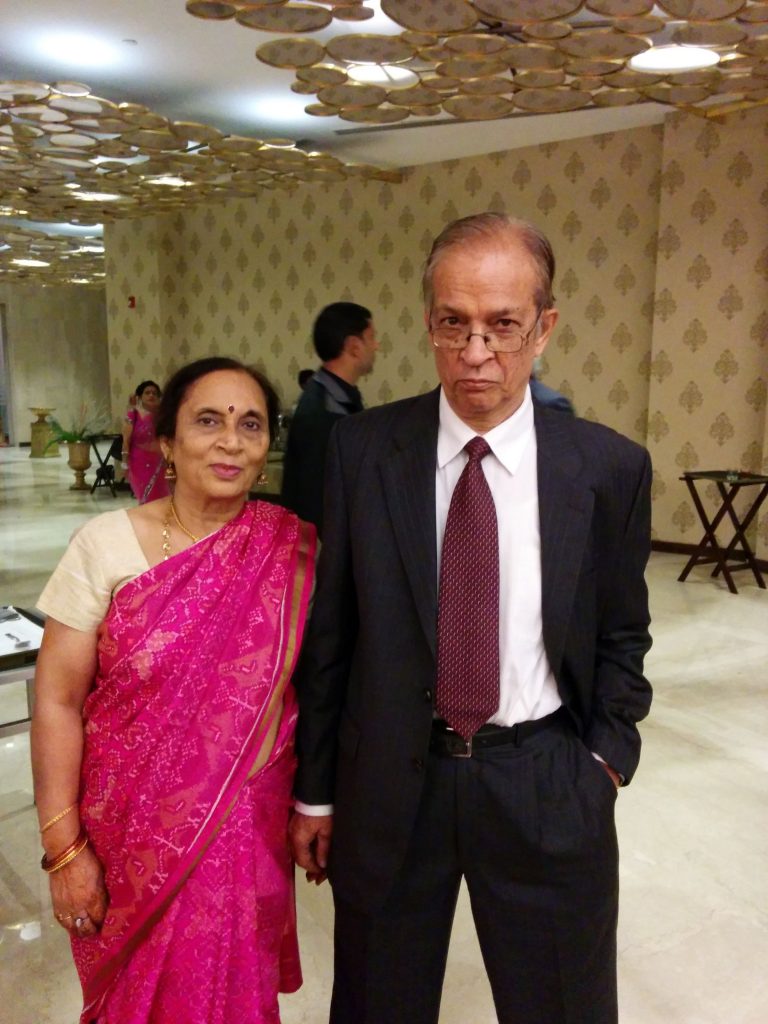What happens when an IAS officer returns from IIMA
by A K Pradhan, IAS, PGP 90
 A K Pradhan with his wife
A K Pradhan with his wife
I joined IIM Ahmedabad at the age of 45 years after a 22-year long career in the Indian Administrative Service. After clearing the challenging CAT and the intense group discussion and interview process, I faced my biggest obstacle which was seeking study leave from the Government of Gujarat to join the course. I faced stiff opposition from my senior colleague who seriously doubted my ability to cope with the rigours of the program. This was further compounded when by chance he met a Professor of IIMA during a flight. The Professor (I won’t reveal his identity as he is since deceased) also echoed similar sentiments perhaps given my age and my having left academics 24 years ago.
Undaunted by the negative feedback, I preserved by first meeting the said Professor who admitted that given that I had cleared the admissions process, there was no legitimate objection to my joining the course. I then persisted in my requests to my senior officers and was finally able to secure the requisite approval. I was the first senior IAS officer to join the PGDM at IIMA.
The course load was heavy but not excessively so. Living in a dorm (D10) with boys many of whom were probably not even born when I joined the IAS was intimidating at first. However, I found the experience interesting and enjoyable.
The IIMA experience was an exhilarating one – the academic experience was rich; the case discussion methodology gave me a sound problem solving perspective. Most of all I learnt the value of planning, time management and collaboration. I also learnt crisis management and being proactive instead of reactive. Most of all it gave an immense fillip to my career progression after I went back to the IAS after graduation.
Up till now I had got routine assignments where the focus was on district administration. However, my skills and knowledge were put to use soon, and I was posted as Secretary Finance (Expenditure) in charge tasked with finally approving all schemes of other departments. The Expenditure department had the reputation of being very conservative and negative. But IIMA gave me a positive and can-do attitude and mindset. I actively supported meritorious budget proposals and changed the prevalent practice of applying a uniform reduction of costs across projects. Rather, I recommended supporting the right schemes without cutting costs which would hamper their efficiency. Further, I was instrumental in modernising the IT and communications infrastructure. For instance, the Information Department was using archaic film projectors for publicity programs. I suggested upgrading these to TV and VCRs. These measures gave me the reputation of being progressive and fair. On the flip side, as I continued wearing jeans to work (a hangover from IIMA days) there were a few raised eyebrows amongst the senior officers!
After three years in the Finance Department for the Gujarat government, I was deputed to the Ministry of Finance, Government of India and allotted the State Plan Finance portfolio. I was able to apply my knowledge of cost accounting, financial modelling and macroeconomics gained at IIMA to critically analyse the budget and annual plans of the various state governments and improve my department’s efficiency. My written and presentation skills, which were honed through the various WAC submissions, equipped me to effectively communicate my ideas.
After a successful stint in Delhi, I returned to the state government where I got posted as Secretary Labour and Employment and was tasked with reviving many closed textile mills in Gujarat. After analysing the financials of these closed mills, I drew up a revival plan which entailed financial support from the government and a debt restructuring scheme by the banks. Through effectively collaborating with various groups and stakeholders and the workers, I was able to oversee the revival of several mills which helped several workers get re-employed.
At the same time, I also oversaw the modernisation of the Industrial Training Institutes which were critical for imparting vocational training and skill upgradation for many. By working with professional training firms who would provide the requisite content, trainers and infrastructure I was able to significantly expand the scope and scale of the ITIs without significant capital and personnel outlay from the state government. The students were able to access best-in-class training material and instructors across a wide array of subjects in a short period of time. The model was both flexible and extremely scalable and appreciated by the Gujarat government.
My last stint in the government was as Additional Chief Secretary, Ports and Fisheries department. I spearheaded the development of the port’s infrastructure in Gujarat through the Public Private Partnership mode. I also leveraged my knowledge of project management and negotiation skills to conclude several concession agreements with large domestic and international port developers. These included the Mundra Container Terminal, the Petronet LNG Terminal and the Shell LNG Terminal. These ports are not only world-class and the most modern globally but are also significant contributors to the state government’s revenue through the revenue share arrangements.
Looking back, I can say with confidence that IIMA imparted me with both the relevant subject knowledge and a sound decision making framework which has stood me in excellent stead in adapting to diverse situations and varied challenges. Apart from the technical and communication skills I have learnt efficient collaboration and effective negotiation capabilities. The campus vibe and interactions with my fellow students invigorated me and also revitalised my perspective. I was able to become an agent of change and implement several initiatives successfully. I would strongly recommend this valuable experience to all the new incumbent IAS officers as a life changing journey.

